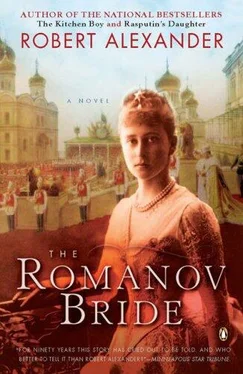One particular morn after our breakfast of porridge and sausage, she took me along, leaving my elder sister, Victoria, and my baby sisters, Alicky and May, at home. This was in 1878, and I had no idea where we were going in our dot of a town, for Mama had seen to the organization of the Alice Society for Aid to Sick and Wounded, which included the founding of many hospitals and homes for the poor. She was very progressive in these things, fighting for the good of the common people and even for clean water and proper bathing practices, something that riled many old-timers who cared naught for a weekly bath. Or a monthly one, for that matter.
However, whatever my mother’s good intentions were that day, I myself wasn’t full of enthusiasm. All of fourteen years of age, I would have much preferred to stay home and draw, or, if work I must, sew a frock or pinafore for a poor child.
“Don’t dawdle, Ella,” she called over her shoulder. “We haven’t much time.”
“But where are we going?” I asked as we quickly walked down a narrow cobbled lane of the Old Quarter.
“There’s a woman in need, that’s all I’ve been told-and that, young lady, is all you need to know.”
Within a few steps we’d left the tangle of streets and come to a part of town I’d never seen before. The road was quite straight but quite unkempt, the small pitched-roof houses half falling down, the filth and waste running freely in the gutters. Children in rags, their faces smeared with dirt, ran this way and that like wild dogs. And when we rounded the next corner a man in torn clothing stared upon us. Had he, I wondered, recognized my mother with her dark hair, slim nose, and blue eyes as none other than the Grand Duchess Alice, or did he have evil thoughts? Of course my father, as ruler of our little Duchy, would have had a fit if he’d known my mother and I had gone not to visit the Alice Hospital or such, but instead descended into the lowest part of town, and were doing so not simply unannounced but without an attendant, let alone a guard of any kind. But that was my mother, a German princess by marriage but forever an English Protestant in her heart and ways. Oh, she was a stubborn woman, that one. Years later, whenever it was just my sisters and I at the tea table, the story always went round and round again how furious Mama had made Grandmama when she decided that she herself and not a wet nurse would feed us children.
Putting down her needlework for a moment, one of my sisters would invariably shout with a laugh, “And what did our dear Grandmama, Queen Victoria, call our dear mother, Grand Duchess Alice?”
“A cow!” we would all cry in unison.
“And what name did our dear Grandmama, the Queen, give for a name to her favorite Highland cow at Balmoral?”
“ Alice!” we would all shout, roaring with laughter.
So that morning, already quite aware of my mother’s determined nature, I brushed back a lock of my fair hair and took Mama by the hand and did not leave her side until we came to a tumbledown cottage. We stopped at a door, crooked and cracked with age, and my mother knocked upon it. When no answer came, she knocked again. Suddenly a child screamed in reply, and without hesitation my very regal mother, small in stature yet eternally energetic, put her shoulder to the door and plowed it open.
Before that moment I could never have imagined such grime, such stench, such chaos. It took a moment for my eyes to adjust to the darkness of the small room with its low ceiling, for no candles were burning and the fire had long since gone cold. Clutching an old wooden chair next to the sole table was a little girl, wearing a torn shirt and nothing below. Obviously something was quite wrong with her, for waste of a very nasty sort was dripping between her legs. The screaming began anew just then, not from this child but another, an infant, lying in some kind of cradle. My mother hurried over to the child, a boy of but a few months, who was likewise covered with his own waste.
Gasping, I breathed in, fully catching the stench. Feeling my breakfast start to rise, I grabbed my own stomach. I was just beginning to wonder whose children these were and what kind of mother could have left them so despondent, when I heard a moan and sensed a person stir against the far wall. It was then that something bloated and red began to reach out from a pile of rags. An arm covered with boils, I realized. Then came a shoulder, all scarlet and glistening with sweat. Finally a face, blotchy red and also spotted with boils. It was a woman, her hair stringy and greasy, her teeth all but gone, her face hideous and swollen. She looked like the ugliest witch from the fairy stories of my youth.
I stepped back and was about to run screaming.
Suddenly my mother took me gently by the hand and in English softly but firmly said, “Ella, my dear, you must learn to treat the sick and needy without hesitation or fear, for that is the true Christian way.”
I gazed into my mother’s small dark eyes and saw a ferocious caring and determination to help others. And so, taking courage from her and following her good Christian example, the two of us set to work. I was more than hesitant as I first occupied myself with kindling fire and boiling water. Soon my task was to clean the waste from the children and bathe them, which was by no means pleasant. Next my mother fed the little ones, which quieted them greatly, and then she made tea, and I watched with admiration as she fed this to the ill woman. Though this seemed to coax the woman out of her delirium, my mother was still concerned, and she sent a neighbor to fetch a doctor.
“But… but I haven’t a florin to my name!” gasped the woman, her face so blotchy.
“You needn’t worry about money, that will be taken care of,” my mother said sternly. “Your only business is to get better.”
“And… and who are you? Why have you come to me?”
“We’ve come because our help was needed.”
“But who-”
“Sh… just rest,” soothed my mother without identifying herself.
By the time we left hours later, the doctor had come and gone and it seemed relatively normal in that little cottage, for we had scrubbed children and floors and all. Indeed, the little ones were fed and asleep, and the woman, whose husband had recently died in a mining accident, was resting comfortably.
As we stepped out onto the little street, my mother leaned over and kissed me on the top of my head, saying, “You did very nicely, sweetheart.”
I took her hand in both of mine and kissed it, and then we proceeded back, chattering mostly in English, some in German, as was our custom. We returned completely unrecognized as mother and daughter of the ruling family until we were within steps of the Neues Palais, our dear home that Mama had decorated in such a very cheerful English manner, chintzes and all.
And that became not only the most treasured memory I have of my mother but one of the last. In a few short months our united family, which had always been bound with love, was torn apart by epidemic. Diphtheria came suddenly and mysteriously, first taking my baby sister, May, just four years old, whose loss alone nearly killed Mama. Indeed, it weakened her so that she, too, fell ill, and though the doctors kept the inhalers filled with chlorate of potash to ease her suffering, she was soon taken by the same disease. My own pain was quite unimaginable, for I was not allowed to look after my poor suffering mother in her final hours nor even to kiss her farewell-for my own safety, I was kept quite apart from my beloveds in their illness. Needless to say, grief overtook my father, and for years thereafter our palace was all but dark.
But then everything changed completely when I came to Russia as the bride of my father’s first cousin, a Romanov-Grand Duke Sergei Aleksandrovich, son of Aleksander II and brother of Aleksander III-and it was at that time that I began to live a life of pomp and wealth beyond the reach of any other earthly kingdom.
Читать дальше












